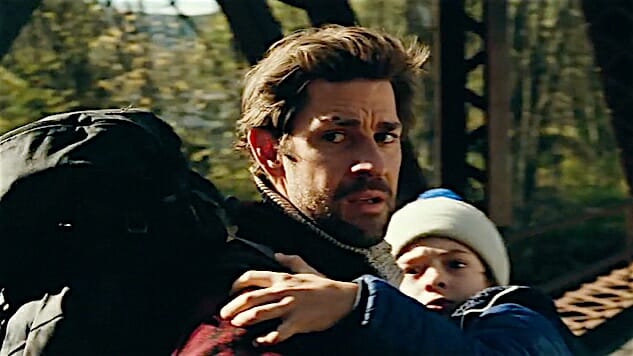A Quiet Place

There’s a narrative hook as well as a thematic hook to A Quiet Place. The narrative hook is a killer—so ingenious, so ruthless—and it holds you in its sway for the entirety of this 95-minute thriller. That hook is so clever that, although this is a horror movie, I sometimes laughed as much as I tensed up, just because I admired the sheer pleasure of its execution. But A Quiet Place’s inventive premise is meant to be supplemented and enriched by its underlying themes, which add an emotional grounding to the fiendish proceedings. That hook doesn’t work nearly as well, however, and I found myself wishing director and co-writer John Krasinski had resisted the understandable temptation to include it. A Quiet Place is an extremely compelling experience—but it could have been greater still.
The film is set not too far in the future, out somewhere in rural America. Krasinski plays Lee Abbott, a married father of two. (It used to be three.) A Quiet Place introduces its conceit with confidence, letting us piece together the terrible events that have occurred. At some point not too long ago, a vicious pack of aliens invaded Earth. The creatures are savagely violent but sightless, attacking their prey through their superior hearing. And so Lee and his family—including wife Evelyn (Emily Blunt) and children Regan (Millicent Simmonds) and Marcus (Noah Jupe)—have learned that, to stay alive, they must be completely silent. Speaking largely through sign language, which the family knew already because Regan is deaf, Lee and his clan have adapted to their bleak, terrifying new circumstance, always vigilant to ensure these menacing critters don’t carve them up into little pieces.
As you might expect, A Quiet Place finds plenty of opportunities for the Abbotts to make sound—usually accidentally—and then gives the audience a series of shocks as the family tries to outsmart the aliens. As with a lot of post-apocalyptic dramas, Krasinski’s third film as a director derives plenty of jolts from the laying out of its unsettling reality. The introduction of needing to be silent, the discovery of what the aliens look like, and the presentation of the ecosystem that has developed since their arrival is all fascinating, but the risk with such films is that, eventually, we’ll grow accustomed to the conceit and get restless. Krasinski and his writers sidestep the problem not just by keeping A Quiet Place short but by concocting enough variations on “Seriously, don’t make a noise” that we stay sucked into the storytelling.
Nothing in his previous work prepares viewers for the precision of A Quiet Place’s horror. Krasinski directed Brief Interviews with Hideous Men and The Hollars, and both films were filled with fine actors let down by showoff-y and sentimental artistic choices from behind the camera. A Quiet Place is much less cutesy, and its craft far advanced. Cinematographer Charlotte Bruus Christensen, composer Marco Beltrami and editor Christopher Tellefsen conspire with Krasinski to deliver a stripped-down, efficient thriller that pares away just about every extraneous detail so that the Abbotts’ plight dominates the frame.
Where A Quiet Place gets occasionally hamstrung is in Krasinski’s insistence on weaving deeper musings into the film. Krasinski and Blunt, who married in 2010, have said that the movie is the most personal thing they’ve ever worked on—specifically responding to the notion of safeguarding children in a dangerous world. The couple have two daughters, so it’s no surprise that A Quiet Place is powered by the panic that parents feel about their powerlessness in the face of all the horrors life can throw at you. The movie can easily be read as an anxious metaphor for parenthood, which is often a fraught dance between being overly protective and letting your kids make their own mistakes—except, in this taut thriller, those mistakes can get you eviscerated.
But the resonance of those themes is compromised by Krasinski’s unsubtle approach. Even all these years after The Office left the air, there’s something permanently Jim-like about Krasinski—a well-meaning niceness that’s pleasant but also a bit cloying. What’s remarkable about A Quiet Place is how often he puts aside that quality, which infected his first two films, to honor his pitiless story. But ultimately, he can’t resist the urge to indulge in a little schmaltz.
-

-

-

-

-

-

-

-

-

-

-

-

-

-

-

-

-

-

-

-

-

-

-

-

-

-

-

-

-

-

-

-

-

-

-

-

-

-

-

-








































